President Trump said Monday that his hard-nosed trade negotiations won some concessions from China and not the trade war his critics had predicted, scoring what he crowed was another victory for his “American First” agenda.
More tough trade bargaining is still to come between the world’s two biggest economies. But Wall Street rallied on the rough outlines of a U.S.-China deal, sending the Dow Jones Industrial Average soaring above 25,000 points for the first time since March.
The investors were not necessarily reacting to Mr. Trump’s rhetoric, said Randy Frederick, vice president of trading and derivatives at the Schwab Center for Financial Research.
“Most investors I talk to know that almost anything Trump says will ultimately either not happen, or it will happen to a lesser degree, so I’m not sure they all bought into the idea of the tariffs to begin with,” he said. “Most realize that is his negotiating method; unorthodox perhaps, but potentially successful in the long run.”
He acknowledged initial apprehension about tariffs but noted that S&P 500 had already rebounded more than 3 percent in the past two weeks without a China breakthrough.
Still, Mr. Trump rubbed Democrats’ faces in the promising developments, singling out his nemesis Senate Minority Leader Charles E. Schumer of New York.
“I ask Senator Chuck Schumer, why didn’t President Obama & the Democrats do something about Trade with China, including Theft of Intellectual Property etc.?” tweeted Mr. Trump. “They did NOTHING! With that being said, Chuck & I have long agreed on this issue! Fair Trade, plus, with China will happen!”
The framework announced over the weekend included China agreeing to “significantly increase” imports of U.S. goods and services to decrease America’s $375 billion trade deficit with China — a top demand by Mr. Trump.
China also agreed in principle to move toward a more level playing field in trade relations and to address the country’s theft or forced transfer of intellectual property from American firms doing business in China.
The U.S. agreed to possibly ease sanctions on ZTE Corp., the second-largest manufacturer of phones in Chia that could go belly up and put 70,000 employees out of work because of the sanctions.
In response to a personal request from Chinese President Xi Jinping, Mr. Trump ordered a review of the ZTE case.
Following two days of talks with a Chinese delegation in Washington, Treasury Secretary Steven T. Mnuchin said the agreement had put on hold a “trade war” and the threat of tariffs on a $150 billion worth of Chinese goods.
China pulled back from retaliating with tariffs on about $50 billion worth of American goods.
Commerce Secretary Wilbur Ross will have to hammer out the details, specifically about increasing exports of agriculture and energy products to China, at the next round of talks in Beijing.
If China doesn’t live up to the agreed framework, Mr. Ross said the U.S. will pull the trigger on tariffs and trade sanctions, known as Section 301 of the Trade Act of 1974.
“The [Section] 301 is a cocked pistol that’s ready to be fired whenever it needs to be fired,” he said on Fox Business Network’s “Mornings with Maria.”
The promise of get-tough trade policies and fixing what Mr. Trump calls “bad trade deals” was a centerpiece of his populist stump speech in the 2016 presidential race. He’s followed through in office with aggressive moves on multiple trade fronts.
Much of the dealmaking remains unfinished, including a rewrite of the North American Free Trade Agreement.
Edward Alden, a senior fellow at the Council on Foreign Relations who specializes in U.S. economic competitiveness, called the framework a “small positive move.”
“Neither side has made significant commitments at this point. The Chinese have just agreed in general terms to purchase a bit more U.S. stuff,” said Mr. Alden, author of the book “Failure to Adjust: How Americans Got Left Behind in the Global Economy.”
Contradicting Mr. Trump’s assertion that he was the first to get China to reduce trade barriers, Mr. Alden noted that decade-long negations with China for its entry to the World Trade Organization resulted in the communist country lowering myriad tariffs and barriers.
However, he agreed with Mr. Trump assessment that previous presidents didn’t do enough to confront China’s unfair trade practices.
“You have to questions whether previous administrations were tough enough on China,” said Mr. Alden. “There is no question the United States did not move as proactively as it should have during the 2000s with China’s exports to the U.S. were rising dramatically. Just to be clear, nothing that President Trump has done to date shows any sort of effective tougher approach. It is all just bluster so far.”
The two sides are far from a final deal and there are fears that the “China hawks” in the White House will blow up the deal, said Michael Camunez, a U.S. ambassador to Mexico under President Bill Clinton who helped implementation NAFTA.
He worried that the China hawks, U.S. Trade Representative Robert Lighthizer and Trade Policy Director Peter Navarro, would undo progress forged by Mr. Mnuchin.
“It is not clear to me at all that when the details are put in front of the Chinese that the agreement will hold. We have to wait and see,” said Mr. Camunez.
He added, “It is certainly good news. I don’t want to sound [negative] but give credit where credit is due. If they can work out a broader deal with the Chinese, that is a good thing.”
• S.A. Miller can be reached at smiller@washingtontimes.com.




Please read our comment policy before commenting.